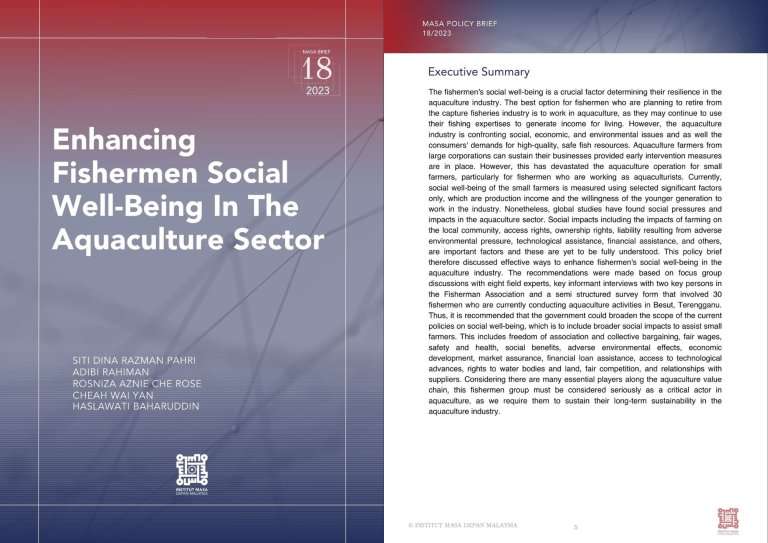The fishermen’s social well-being is a crucial factor determining their resilience in the aquaculture industry. The best option for fishermen who are planning to retire from the capture fisheries industry is to work in aquaculture, as they may continue to use their fishing expertises to generate income for living. However, the aquaculture industry is confronting social, economic, and environmental issues and as well the consumers’ demands for high-quality, safe fish resources. Aquaculture farmers from large corporations can sustain their businesses provided early intervention measures are in place. However, this has devastated the aquaculture operation for small farmers, particularly for fishermen who are working as aquaculturists. Currently, social well-being of the small farmers is measured using selected significant factors only, which are production income and the willingness of the younger generation to work in the industry. Nonetheless, global studies have found social pressures and impacts in the aquaculture sector. Social impacts including the impacts of farming on the local community, access rights, ownership rights, liability resulting from adverse environmental pressure, technological assistance, financial assistance, and others, are important factors and these are yet to be fully understood. This policy brief therefore discussed effective ways to enhance fishermen’s social well-being in the aquaculture industry. The recommendations were made based on focus group discussions with eight field experts, key informant interviews with two key persons in the Fisherman Association and a semi structured survey form that involved 30 fishermen who are currently conducting aquaculture activities in Besut, Terengganu. Thus, it is recommended that the government could broaden the scope of the current policies on social well-being, which is to include broader social impacts to assist small farmers. This includes freedom of association and collective bargaining, fair wages, safety and health, social benefits, adverse environmental effects, economic development, market assurance, financial loan assistance, access to technological advances, rights to water bodies and land, fair competition, and relationships with suppliers. Considering there are many essential players along the aquaculture value chain, this fishermen group must be considered seriously as a critical actor in aquaculture, as we require them to sustain their long-term sustainability in the aquaculture industry.
#18: Enhancing Fishermen Social Well-Being In The Aquaculture Sector
- 15 Jan 2024
- Policy Brief, MASA Policy Development Programme
